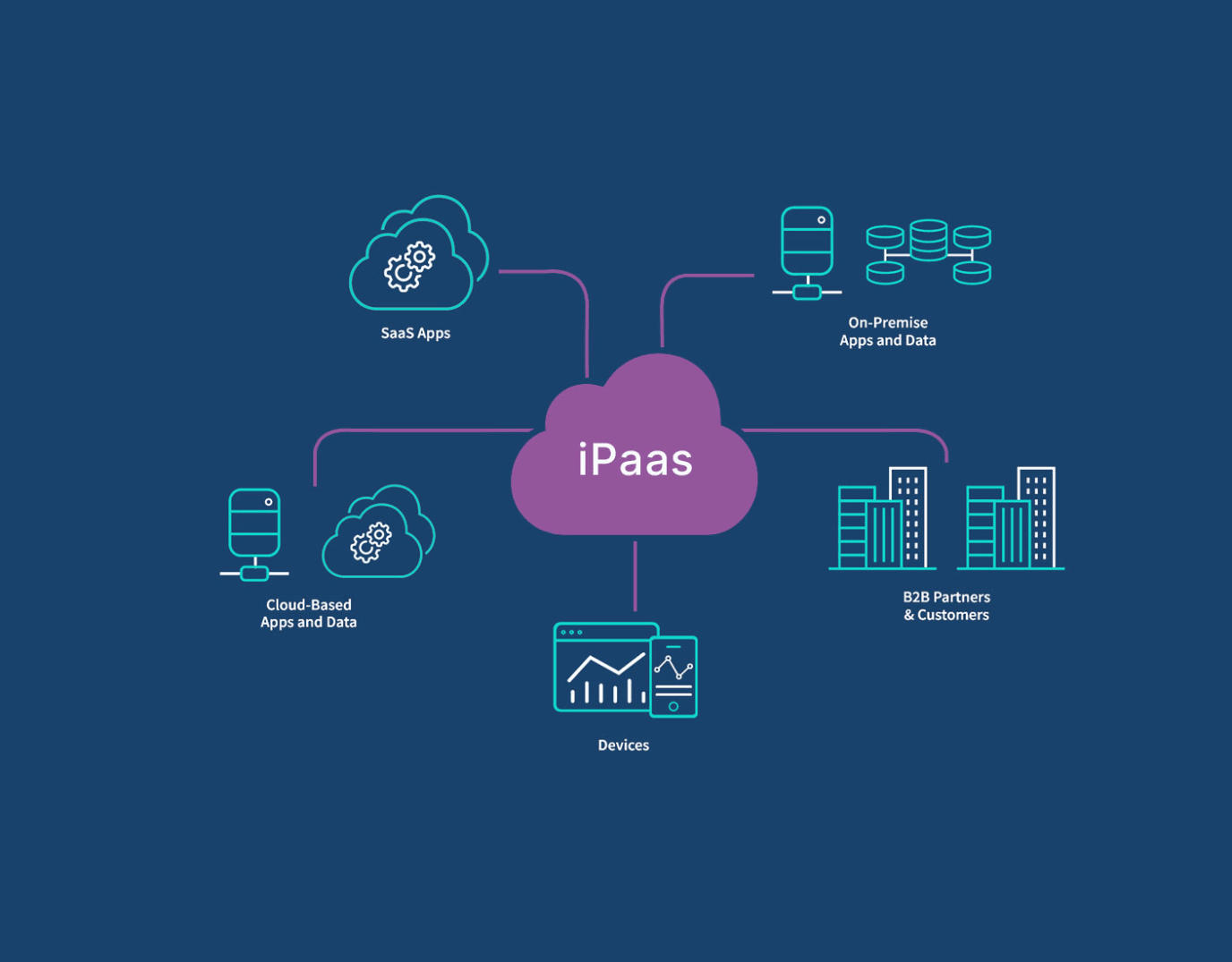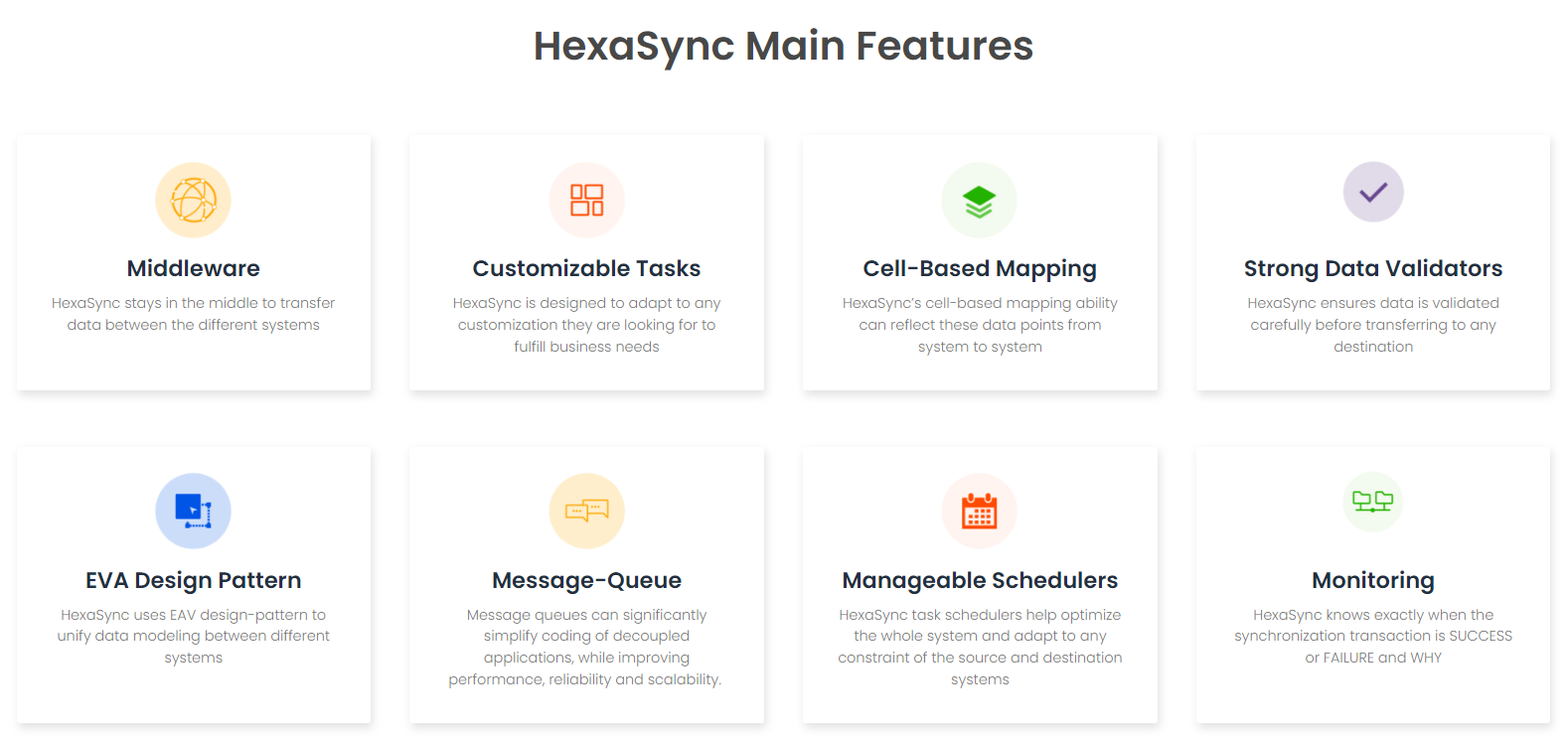Constantly seeking innovative ways to integrate diverse applications and systems seamlessly has become the top priority for businesses. iPaaS stands out as a key technology, bridging the gap between cloud and on-premise software, vital for promoting agility, boosting efficiency, and driving digital transformation. In this article, let’s highlight the critical factors you should consider when selecting an iPaaS vendor, helping you make a choice that fits your business’s strategic goals.
Understanding iPaaS

iPaaS, or Integration Platform as a Service, is a cloud-based solution that enables the integration of various applications, data, and processes across both cloud and on-premises environments. It simplifies the automation of workflows and data sharing, eliminating the need for custom coding. iPaaS is essential for businesses aiming to streamline operations, enhance decision-making, and improve customer experiences through seamless data flow and system connectivity.
iPaaS is key to digital transformation, enabling swift adaptation to market shifts and competitive advantage through optimized tech investments. It simplifies IT, cuts costs, scales integrations, and ensures data security and compliance.
Key Benefits of iPaaS:
- Integration capabilities: Support a wide array of applications, data formats, and protocols for seamless connectivity.
- Scalability: Easily adjusts to changing data volumes and business needs.
- User-friendly: Offers a straightforward interface with drag-and-drop features and minimal coding.
- Real-time processing: Enables immediate data integration and availability.
- Security and Compliance: Ensures data protection and adheres to legal standards like GDPR and HIPAA.
- Reliability: Guarantees consistent uptime and smooth operation.
- Monitoring and analytics: Provides tools for performance tracking and optimization.
- Customization: Allows tailoring of integrations to meet specific business requirements.
- Support: Offers strong technical support, documentation, and a user community.
- Cost-effectiveness: Present a transparent and flexible pricing model to fit budgetary constraints.
Key criteria for considering an iPaaS vendor

When evaluating an iPaaS vendor, it’s essential to consider several key criteria to ensure the platform meets your organization’s needs for integrating various applications and systems. Here’s what to look for:
Brand Credibility
Credibility is key when choosing an iPaaS vendor. Evaluate their reputation through reliability, innovation, and customer satisfaction. Research their market presence, longevity, and client success stories. Testimonials, case studies, and reviews can offer valuable insights into their service quality. A reputable iPaaS provider demonstrates a commitment to meeting customer needs and evolving with the digital landscape, ensuring a trustworthy investment for your business.
Integration Capabilities
The integration capabilities of iPaaS vendors are crucial, offering extensive connectors, APIs, and templates for seamless connections between cloud and on-premise systems. These capabilities support diverse data formats and real-time processing, enabling efficient workflow automation and data synchronization across business operations. When choosing an iPaaS vendor, ensure their platform meets current needs and can scale for future growth and technological changes.
Security and Compliance
The right iPaaS provider ensures that data security and regulatory compliance are integral to their service, offering peace of mind and protecting your business’s reputation. When evaluating vendors, verify their security credentials and compliance certifications to confirm they meet the highest standards required for your business operations.
Ease of Use Solution
Ease of use is essential in iPaaS solutions, with an intuitive interface, drag-and-drop capabilities, and low coding needs, making them accessible for all skill levels. Such user-friendly features speed up integration from design to deployment, enabling swift customization without extensive technical knowledge. This not only cuts down on IT dependency but also helps businesses quickly adapt to new integration demands. Evaluate iPaaS vendors based on their platform’s usability and available support to ensure efficient adoption and management.
Reusability
Reusability in iPaaS solutions allows businesses to efficiently scale their integration efforts. Vendors offering pre-built connectors, templates, and workflows enable organizations to repurpose existing integration assets for new projects, saving time and resources. This feature facilitates faster deployment, reduces costs, and enhances agility in responding to evolving requirements. When selecting an iPaaS vendor, consider their support for creating and managing reusable, modular components that are adaptable across various integration scenarios.
Governed Access
Governed access in iPaaS ensures that only authorized users can access sensitive data and integration workflows, crucial for data security and compliance. It employs role-based access controls to prevent unauthorized actions, protecting against security threats and compliance issues. When choosing an iPaaS vendor, verify their capabilities for strict access management to maintain secure and compliant integration operations.
HexaSync Integration Platform – A Global iPaaS Vendor

HexaSync is a global iPaaS vendor that helps organizations connect eCommerce, POS, accounting, ERP, CRM, and BI to automate business processes.
It works as middleware to help organizations connect and integrate legacy systems with modern SaaS applications via APIs and access tokens. Using HexaSync, users can monitor the flow of data transfers from the source location to the destination location. So, they can detect the problems and solve them if they are not technical. You can integrate with hundreds of applications, such as Shopify, Magento, BigCommerce, Salesforce, Hubspot, Microsoft Dynamics 365, and many others, to automate business workflows.
Key Features
- Middleware: HexaSync stays in the middle to transfer data between the different systems
- EAV Design Pattern: HexaSync uses an EAV design pattern to unify data modeling between different systems
- Cell-Based Mapping: Help reflect any kind of data points from system to system
- Message Queue-Based Architecture: HexaSync simplifies the coding of decoupled applications and provides better performance, reliability, and scalability
- Customizable Tasks: HexaSync is designed to adapt to any customization they are looking for to fulfill business needs
- Monitoring: HexaSync knows exactly when the synchronization transaction is SUCCESS or FAILURE and WHY
- Manageable Schedulers: HexaSync task schedulers help automate everything we need.
Conclusion
Choosing the right iPaaS vendor is a strategic decision that can significantly impact your business’s operational efficiency and innovation capabilities. By focusing on compatibility, ease of use, scalability, security, customer support, and pricing, you can select an iPaaS solution that not only meets your current needs but also supports your future growth ambitions. Investing the time and effort to thoroughly evaluate potential vendors will pay dividends by ensuring a successful digital transformation journey for your business.